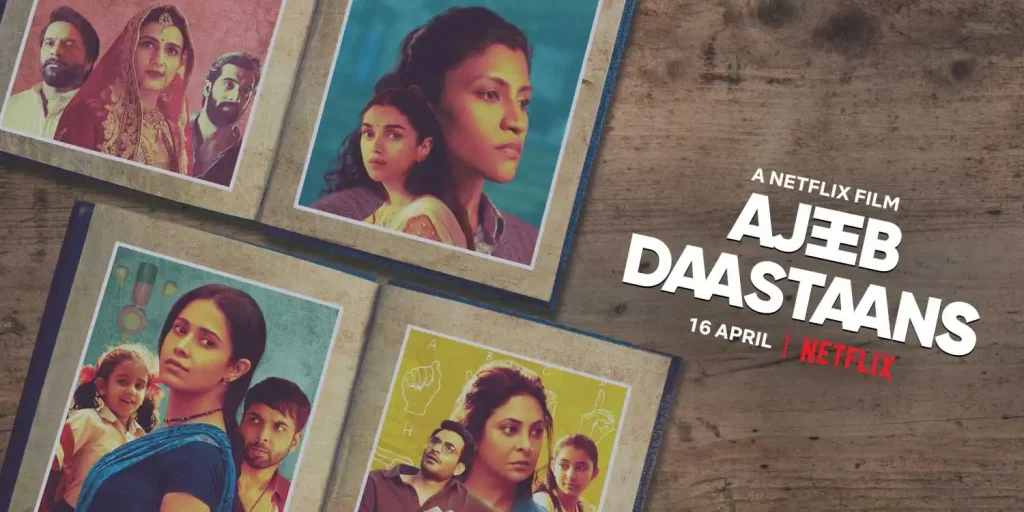
Cast: Aditi Rao Hydari, Fatima Sana Shaikh, Jaideep Ahlawat, Abhishek Bannerjee, Nushrat Barucha, Manav Kaul, Shefali Shah, Konkana Sen Sharma
Directors: Shashank Khaitan, Raj Mehta, Neeraj Ghaywan, and Kayoze Irani
BLUF: Ajeeb Dastans is an anthology of meandering short movies intended to knock our collective senses out in four distinct directions. The themes explored being that of jealousy, entitlement, prejudices, and toxicity, the plots resonate with the unique socio-cultural backdrop of Indian society. Between a couple forced into an arranged marriage where the men get away with the upper hand, the class struggle of a maid and a laundryman, gendered experiences of two women working in different corners of a factory belonging to different castes, and a woman navigating her daughter’s hearing disability with everything that comes along in terms of her own emancipation, the stories are expansive yet constricting. The all-encompassing premise remains that of intricate human relationships in the greater Indian socio-cultural caste/ class divide. The brilliance of the narrative stands out.
THE MEAT AND THE POTATOES/ FWAR/ IN THE ZONE:
Majnu directed by Shashank Khaitan is about Babloo (Jaideep Ahlawat) who is forced to marry the daughter of an MLA, Leepakshi (Fatima Sana Shaikh). Babloo tells her that he wants nothing to do with her, so Leepakshi chooses to defy societal norms and seek happiness outside of marriage in a slew of affairs most of which ended with Babloo torturing the poor souls who dared mess with his wife because hey how dare they? She, on the other hand, gets sadistic pleasure out of torturing poor souls as revenge for being stuck in a soulless marriage. It is the most toxic association. Till one day Raj Kumar (Armaan Ralhan), the son of the family’s driver appears and is recruited by Babloo and it reveals the hypocrisy, lust, and desire beneath the societal norms, perceptions, and beliefs from men and women from apparently distinguished families.
Khilauna directed by Raj Mehta has an intricate plot with Meenal (Nushrratt Bharuccha) a street smart house-help with a kid sister with a talent for conning her employers into offering free food and hanging out with Sushil (Abhishek Banerjee) the clothes ironing guy. When the electricity in Meenal’s dilapidated home is cut, she decides to seek help from a man who also offers her a job. As a toughie in a system that’s too cruel to people like Meenal, she must find a way to salvage some of the power taken away from her. Mehta’s short is a keenly observant film on how the lower class is pushed to inhuman levels in their fight for basic human rights.
Geeli Pucchi directed by Neeraj Ghaywan is the story of Bharti (Konkana Sen Sharma), the only woman in a factory full of male workers being treated unfairly due to the class and caste she belongs to. Bharti’s drab, not-so-happening life changes when she is passed up for a promotion which is offered to newcomer Priya Sharma (Aditi Rao Hydari), who is a brahmin. As two women on completely different sides of a male-dominated workplace, they stick together, eventually opening up about their battles. While Bharti falls for Priya, the latter is struggling to be an ideal wife in an upper-class Hindu family. Told through a lens of caste and class, through a gendered perspective the film explores intersectional realities brilliantly. Hydari and Sharma perform exceptionally restrained, dramatic makeovers as they essay their roles as friends and then as they choose to take over the societal hierarchy or career advancement. The resultant chemistry is genius in cinematic history.
Ankahi directed by Kayoze Irani featuring Shefali Shah, Manav Kaul, and Tota Roy Chowdhury in a bit of a sluggish play. Natasha (Shah), the mother of a teenage daughter who is slowly losing her sense of hearing has a husband not so in their daughter’s issues. She starts seeks compassion elsewhere with a speech impaired Kabir (Manav Kaul). Ankahi makes reference to the matters that are excluded in verbal and non-verbal communication. As Shefali Shah and Manav Kaul express themselves perfectly in the absence of dialogues you see that to communicate, words are not important.
Ajeeb Dastans shocks with its narratives in more ways than one. The simple stories with interwoven heartbreaking stories of common people stuck in situations, not of their own making are very well crafted. Each actor is phenomenal. We could not find any story lesser than the other. A brilliantly crafted anthology. For once, way to go K’Jo.
WHAT WE LOVED
Everything
WHAT WE MISSED
Kuch Kuch Hota hai




